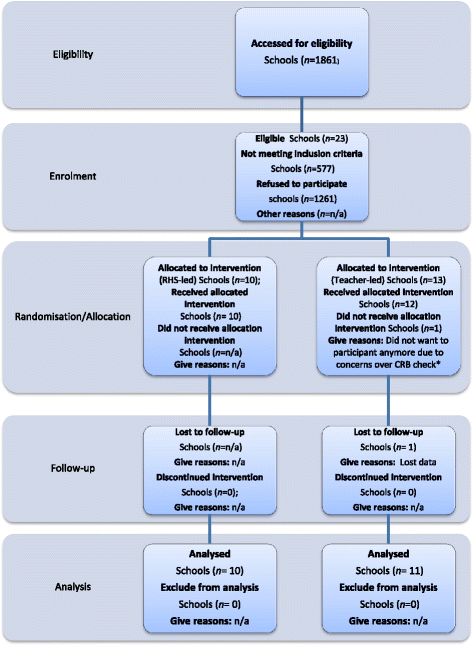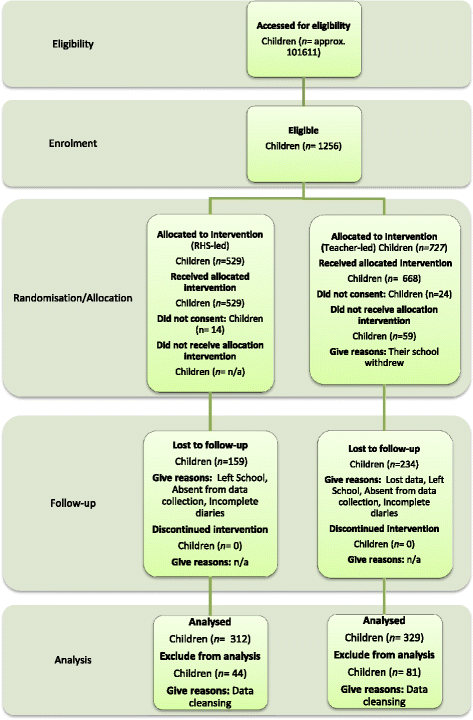Evaluation of the impact of a school gardening intervention on children's fruit and vegetable intake: a randomised controlled trial
- PMID: 25128211
- PMCID: PMC4142134
- DOI: 10.1186/s12966-014-0099-7
Evaluation of the impact of a school gardening intervention on children's fruit and vegetable intake: a randomised controlled trial
Abstract
Background: Current academic literature suggests that school gardening programmes can provide an interactive environment with the potential to change children's fruit and vegetable intake. This is the first cluster randomised controlled trial (RCT) designed to evaluate whether a school gardening programme can have an effect on children's fruit and vegetable intake.
Methods: The trial included children from 23 schools; these schools were randomised into two groups, one to receive the Royal Horticultural Society (RHS)-led intervention and the other to receive the less involved Teacher-led intervention. A 24-hour food diary (CADET) was used to collect baseline and follow-up dietary intake 18 months apart. Questionnaires were also administered to evaluate the intervention implementation.
Results: A total of 641 children completed the trial with a mean age of 8.1 years (95% CI: 8.0, 8.4). The unadjusted results from multilevel regression analysis revealed that for combined daily fruit and vegetable intake the Teacher-led group had a higher daily mean change of 8 g (95% CI: -19, 36) compared to the RHS-led group -32 g (95% CI: -60, -3). However, after adjusting for possible confounders this difference was not significant (intervention effect: -40 g, 95% CI: -88, 1; p = 0.06). The adjusted analysis of process measures identified that if schools improved their gardening score by 3 levels (a measure of school gardening involvement - the scale has 6 levels from 0 'no garden' to 5 'community involvement'), irrespective of group allocation, children had, on average, a daily increase of 81 g of fruit and vegetable intake (95% CI: 0, 163; p = 0.05) compared to schools that had no change in gardening score.
Conclusions: This study is the first cluster randomised controlled trial designed to evaluate a school gardening intervention. The results have found very little evidence to support the claims that school gardening alone can improve children's daily fruit and vegetable intake. However, when a gardening intervention is implemented at a high level within the school it may improve children's daily fruit and vegetable intake by a portion. Improving children's fruit and vegetable intake remains a challenging task.
Trial registration: ISRCTN11396528.
Figures
References
-
- WHO: Obesity: Preventing and managing the Global Epidemic - Report of a WHO Consultation on Obesity, 3-5 June 1997, Geneva, WHO/NUT/NCD/98.1. 1997, ᅟ:ᅟ; [http://www.who.int/nutrition/publications/obesity_executive_summary.pdf] - PubMed
-
- Bazzano LA, He J, Ogden LG, Loria CM, Vupputuri S, Myers L, Whelton PK. Fruit and vegetable intake and risk of cardiovascular disease in US adults: the first National Health and Nutrition Examination Survey Epidemiologic Follow-up Study. Am J Clin Nutr. 2002;76:93–99. - PubMed
-
- Boffetta P, Couto E, Wichmann J, Ferrari P, Trichopoulos D, Bueno-de-Mesquita HB, van Duijnhoven FJ, Büchner FL, Key T, Boeing H, Nöthlings U, Linseisen J, Gonzalez CA, Overvad K, Nielsen MR, Tjønneland A, Olsen A, Clavel-Chapelon F, Boutron-Ruault MC, Morois S, Lagiou P, Naska A, Benetou V, Kaaks R, Rohrmann S, Panico S, Sieri S, Vineis P, Palli D, van Gils CH, et al. Fruit and vegetable intake and overall cancer risk in the European Prospective Investigation into Cancer and Nutrition (EPIC) J Natl Cancer Inst. 2010;102(8):529–537. doi: 10.1093/jnci/djq072. - DOI - PubMed
-
- Harding A, Wareham NJ, Bingham SA, Khaw K, Luben R, Welch A, Forouhi NG. Plasma vitamin C level, fruit and vegetable consumption, and the risk of new-onset type 2 diabetes mellitus: the European prospective investigation of cancer–Norfolk prospective study. Arch Intern Med. 2008;168(14):1493–1499. doi: 10.1001/archinte.168.14.1493. - DOI - PubMed
Publication types
MeSH terms
Grants and funding
LinkOut - more resources
Full Text Sources
Other Literature Sources



